大学英语精读3第三课fruitful questions PPT
- 格式:ppt
- 大小:1.07 MB
- 文档页数:54
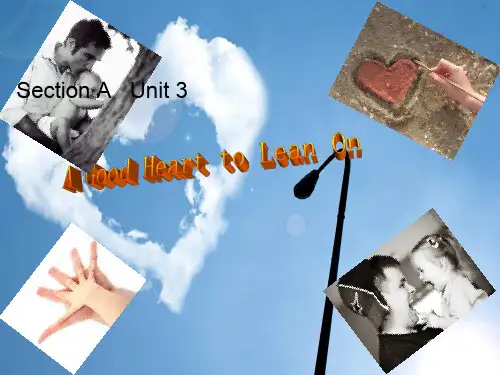
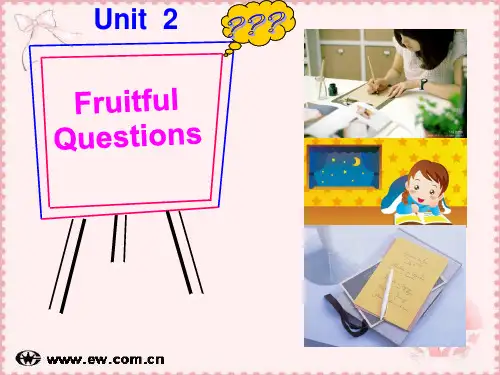
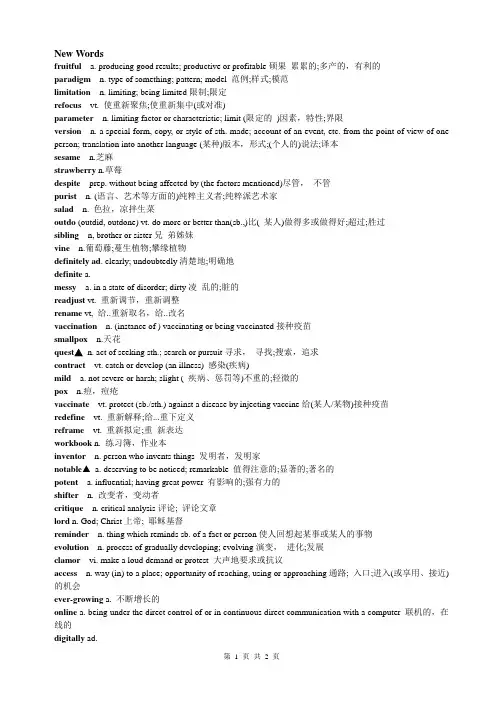
New Wordsfruitful a. producing good results; productive or profitable硕果累累的;多产的,有利的paradigm n. type of something; pattern; model 范例;样式;模范limitation n. limiting; being limited限制;限定refocus vt. 使重新聚焦;使重新集中(或对准)parameter n. limiting factor or characteristic; limit (限定的)因素,特性;界限version n. a special form, copy, or style of sth. made; account of an event, etc. from the point of view of one person; translation into another language (某种)版本,形式;(个人的)说法;译本sesame n.芝麻strawberry n.草莓despite prep. without being affected by (the factors mentioned)尽管,不管purist n. (语言、艺术等方面的)纯粹主义者;纯粹派艺术家salad n. 色拉,凉拌生菜outdo (outdid, outdone) vt. do more or better than(sb.,)比( 某人)做得多或做得好;超过;胜过sibling n, brother or sister兄弟姊妹vine n.葡萄藤;蔓生植物;攀缘植物definitely ad. clearly; undoubtedly清楚地;明确地definite a.messy a. in a state of disorder; dirty凌乱的;脏的readjust vt. 重新调节,重新调整rename vt, 给..重新取名,给..改名vaccination n. (instance of ) vaccinating or being vaccinated接种疫苗smallpox n.天花quest▲n. act of seeking sth.; search or pursuit寻求,寻找;搜索,追求contract vt. catch or develop (an illness) 感染(疾病)mild a. not severe or harsh; slight ( 疾病、惩罚等)不重的;轻微的pox n.痘,痘疮vaccinate vt. protect (sb./sth.) against a disease by injecting vaccine给(某人/某物)接种疫苗redefine vt. 重新解释;给...重下定义reframe vt. 重新拟定;重新表达workbook n. 练习簿,作业本inventor n. person who invents things 发明者,发明家notable▲a. deserving to be noticed; remarkable 值得注意的;显著的;著名的potent a. influential; having great power 有影响的;强有力的shifter n. 改变者,变动者critique n. critical analysis评论; 评论文章lord n. God; Christ上帝; 耶稣基督reminder n. thing which reminds sb. of a fact or person使人回想起某事或某人的事物evolution n. process of gradually developing; evolving演变,进化;发展clamor vi. make a loud demand or protest 大声地要求或抗议access n. way (in) to a place; opportunity of reaching, using or approaching通路; 入口;进入(或享用、接近)的机会ever-growing a. 不断增长的online a. being under the direct control of or in continuous direct communication with a computer 联机的,在线的digitally ad.digital a. showing amounts by means of numbers数字的; 数字显示的web▲/web/ n. (蜘蛛等动物结的)网;网络;错综复杂的事物download vt. transfer (a program, data, etc.) from a large computer system to a smaller one 将(程序、资料等)下载data n.资料,数据instantaneously ad.instantaneous a. happening or done immediately 即时的;瞬间的super a. ( infml.) excellent; splendid 极好的;了不起的highway n. (esp US) main public road 公路;交通要道nowhere ad. not anywhere 无处Earth-shattering a.惊天动地的;极其重大的;影响深远的shatter V. (cause sth. to) break suddenly and violently into small pieces (使)粉碎pun n. humorous use of a word that has two meanings or of different words that sound the same 双关(语) intend vt. have (a particular purpose or plan) in mind; mean打算; 意欲view vt. look at or watch (sth.) carefully; consider 察看;考虑,看待uncover vt. make known or disclose (sth.); discover揭露,暴露;发现preventive a. preventing or intended to prevent sth; precautionary预防(性)的;防备的downshift V. (将)(汽车)调低速档Phrases & Expressionstake out remove 拿出;抽出think up produce (a new idea, etc.) by thinking hard想出in short in a few words; briefly总之; 简言之bring up call attention to; raise使注意; 提出Proper NamesSesame Street芝麻街(美国幼儿电视教育节目)Copernicus 哥白尼(1473- 1543,波兰天文学家)Reuben Mattus鲁宾.马修斯Bronx 布朗克斯区(美国纽约市行政区名)Haagen-Dazs哈根达斯(一种冰淇淋品牌)Edward Jenner爱德华,詹纳(1749-1823,英国医生)Thomas Kuhn托马斯.库恩(1922- 1996, 美国科学史家)World Wide Web环球信息网,万维网。
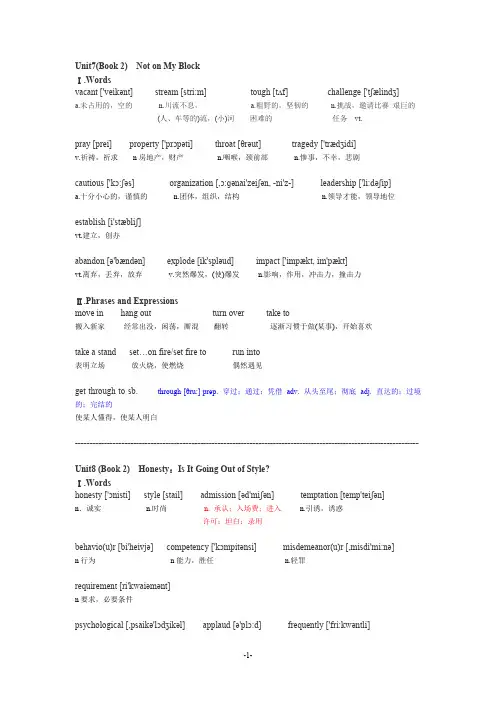
Unit7(Book 2) Not on My BlockⅠ.Wordsvacant ['veikənt]stream [stri:m] tough [tʌf]challenge ['tʃælindʒ]a.未占用的,空的n.川流不息, a.粗野的,坚韧的n.挑战,邀请比赛艰巨的(人、车等的)流,(小)河困难的任务vt.pray [prei] property ['prɔpəti]throat [θrəut]tragedy ['trædʒidi]v.祈祷,祈求n房地产,财产n.咽喉,颈前部n.惨事,不幸,悲剧cautious ['kɔ:ʃəs]organization [,ɔ:ɡənai'zeiʃən, -ni'z-] leadership ['li:dəʃip]a.十分小心的,谨慎的n.团体,组织,结构n.领导才能,领导地位establish [i'stæbliʃ]vt.建立,创办abandon [ə'bændən]explode [ik'spləud]impact ['impækt, im'pækt]vt.离弃,丢弃,放弃v.突然爆发,(使)爆发n.影响,作用,冲击力,撞击力Ⅱ.Phrases and Expressionsmove in hang out turn over take to搬入新家经常出没,闲荡,厮混翻转逐渐习惯于做(某事),开始喜欢take a stand set…on fire/set fire to run into表明立场放火烧,使燃烧偶然遇见get through to sb. through [θru:] prep. 穿过;通过;凭借adv. 从头至尾;彻底adj. 直达的;过境的;完结的使某人懂得,使某人明白----------------------------------------------------------------------------------------------------------------------Unit8 (Book 2) Honesty:Is It Going Out of Style?Ⅰ.Wordshonesty ['ɔnisti]style [stail] admission [əd'miʃən]temptation [temp'teiʃən]n.诚实n.时尚n. 承认;入场费;进入n.引诱,诱惑许可;坦白;录用behavio(u)r [bi'heivjə]competency ['kɔmpitənsi]misdemeanor(u)r [,misdi'mi:nə]n行为n能力,胜任n.轻罪requirement [ri'kwaiəmənt]n要求,必要条件psychological [,psaikə'lɔdʒikəl]applaud [ə'plɔ:d]frequently ['fri:kwəntli]a.心理学的,心理的,精神上的vt.拍手称赞ad. 时常,屡次;频繁地,经常地character ['kærəktə]n. 字符;特性;角色;性格,品质vt. 使具有特征;印,刻supermarket ['sju:pə,mɑ:kit]numerous ['nju:mərəs]evidence ['evidəns]n超级市场 a. 许多的,很多的n.证据Ⅱ.Phrases and Expressionsout of style according to according [ə'kɔ:diŋ] adj. 相符的adv. 依照过时的,不再流行的根据,按照;取决于;据…所说(be) faced with a case in point面对恰当的例子think of...as on the other hand go down把…看作另一方面,反过来说下降,减少----------------------------------------------------------------------------------------------------------------------Unit9 (Book 2) What Is Intelligence,AnywayⅠ.Wordsaptitude ['æptitju:d] register ['redʒistə]complacent [kəm'pleisənt]n能力,才能vt.取得,登记a自满的,自鸣得意的academic [,ækə'demik]a学术的,学究的,学院的estimate ['estimeit] explore [ik'splɔ:]pronouncement [prəu'naunsmənt]vi. 估计,估价vt.探索,探究n声明,见解n. 估计,估价;判断,看法vt. 估计,估量;判断,评价absolute ['æbsəlju:t,,æbsə'lju:t]a. 绝对的;完全的;专制的n. 绝对事物;绝对determine [di'tə:min]numerical [nju:'merikəl]evaluation [i,vælju'eiʃən]vt. 决定;使…下定决心;判决 a.数字的,用数字表示的n估价,评价vi. 决定;确定;判决,终止subsection ['sʌb,sekʃən,sʌb's-]n.小组,分部automobile ['ɔ:təməubi:l,,ɔ:təmə'bi:l]hammer ['hæmə]n汽车n锤子,榔头vⅡ.Phrases and Expressionsmake a fuss of/over fuss [fʌs] vi. 小题大作;忙乱;焦燥;焦急;无事自扰n. 大惊小怪,大惊小怪的人;小题大作;忙乱vt. 使烦恼,使烦忧为…大惊小怪make up by one’s estimate编制,配制根据某人估计take sth. for granted grant [ɡrɑ:nt,ɡrænt] vt. 授予;承认;允许vi. 同意n. 授予物;拨款认为某事理所当然pick out for sure挑选确切地,肯定----------------------------------------------------------------------------------------------------------------------Unit10 (Book 2) Profits of PraiseⅠ.Wordsprofit ['prɔfit]exhaust [iɡ'zɔ:st]weary ['wiəri]application [,æpli'keiʃən]n益处,利润vt使筋疲力尽 a.厌倦的,厌烦的n. 应用;申请;敷用;应用程序reluctant [ri'lʌktənt]compliment ['kɔmplimənt]embarrass [im'bærəs]a不情愿的,勉强的n. 恭维;问候;致意;称赞;道贺vt. 使局促不安;使困窘;阻碍vt. 恭维;称赞surprisingly surprising [sə'praiziŋ]ad. 惊人地;出人意外地comment ['kɔment]rewarding [ri'wɔ:diŋ]glorious ['ɡlɔ:riəs]appreciate [ə'pri:ʃieit]n.评论a值得(做)的,报答的a辉煌的vt欣赏,鉴赏,感谢,感激peacefully peaceful ['pi:sful]ad. 平静地constructive [kən'strʌktiv]dramatically [drə'mætikəli]a.建设性的ad.显著地Ⅱ.Phrases and Expressionsmake out only too shrug off shrug [ʃrʌɡ] vt. 耸肩,耸肩表示n. 耸肩vi. 耸肩开出,填写极,非常耸肩表示对…不屑理睬pat on the back pat [pæt] a. 恰好的;熟练的;合适的ad. 恰好;熟记地n. 小块;轻拍;轻拍声vt. 轻拍vi. 轻拍赞扬,鼓励pass on live on传递靠…生活----------------------------------------------------------------------------------------------------------------------Unit1 (Book 3) A Brush with the LawⅠ.Wordscircumstance ['sə:kəmstəns]subsequent ['sʌbsikwənt]temporary ['tempərəri]n情况,环境a随后的,接下去的 a.暂时的employment [im'plɔimənt]n职业,工作arrestable arrest [ə'rest] vt. 吸引;逮捕;阻止n. 逮捕;监禁a. 可逮捕的regard (as) regard [ri'ɡɑ:d, ri:-]n. 注意;尊重;凝视;问候vt. 把…看作;注重,考虑;看待;尊敬;与…有关vi. 注意,注重;注视vt. 把…认作conversational [,kɔnvə'seiʃənəl]confirm [kən'fə:m]a会话(用)的vt证实,肯定,确认magistrate ['mædʒistreit]defence [di'fens] dismiss [dis'mis]n地方法官n. 防御;防卫;防卫设备;答辩vt.驳回,对…不予受理,免…的职,解雇respectable [ri'spektəbl]a.值得尊敬的brilliant ['briljənt]complain [kəm'plein]successful [sək'sesful]a辉煌的,卓越的vi. 发牢骚;投诉;诉说vt. 抱怨;控诉 a. 成功的;一帆风顺的Ⅱ.Phrases and Expressionsa coupe of coupe [ku:p] n. 小轿车;双座四轮轿式马车take one’s time少数,几(个),一对慢慢来,不着急at first起先,首先;最初call on stand a chance turn against要求有机会,有希望反对;背叛;(使)变成和…敌对----------------------------------------------------------------------------------------------------------------------Unit2 (Book 3) Fruitful QuestionsⅠ.Wordsfruitful ['fru:tful] limitation [,limi'teiʃən]parameter [pə'ræmitə]a.硕果累累的,多产的,有利的n.限制,限定n. (限定的)因素,特性,界限version ['və:ʃən]n.(某种)版本形式,(个人的)说法,译本strawberry ['strɔ:bəri]definitely ['definitli] contract ['kɔntrækt,kən'trækt]n.草莓ad.清楚地,明确地vt. 感染(疾病)mild [maild]a.(疾病、惩罚等)不重的,轻微的notable ['nəutəbl]evolution [,i:və'lu:ʃən, ,ev-]a.值得注意的,显著地,著名的n.演变,进化,发展access ['ækses, 'æksəs, æk'ses] super ['sju:pə]n.通路,入口,进入(或享用、接近)的机会 a.极好的,了不起的highway ['haiwei] shatter ['ʃætə]view [vju:]n.公路,交通要道v.使粉碎vt.察看,考虑,看待Ⅱ.Phrases and Expressionstake out 拿出,抽出think up 想出in short 总之,简言之bring up 使注意,提出Unit2 (Book 3) Why I TeachⅠ.Wordsadministration [əd,mini'streiʃən]mechanic [mi'kænik] profession [prəu'feʃən]n.管理(部门),行政(机关) n.机械工,机修工n. 职业,专业;声明,宣布,表白opportunity [,ɔpə'tju:niti]n. 时机,机会stimulate ['stimjuleit] self-reliance ['selfri'laiəns]technological [,teknə'lɔdʒikəl]vt.刺激,激励n.依靠自己,自力更生 a.技术的corporation [,kɔ:pə'reiʃən]n.(AmE)有限公司distribution [,distri'bju:ʃən]energetic [,enə'dʒetik]journal ['dʒə:nəl]n. 分配;分布 a.精力充沛的n.杂志,日报occasional [ə'keiʒənəl,əu-]a. 偶然的;临时的;特殊场合的intuition [,intju:'iʃən]analysis [ə'næləsis]creation [kri:'eiʃən]n.直觉n.分析n. 创造,创作;创作物,产物Ⅱ.Phrases and Expressionsstay up take notes keep a diary diary ['daiəri] n. 日记簿;日志,日记不睡觉,熬夜记笔记记日记leave out send off遗漏,省去;不考虑寄出;派遣;给…送行catch one’s breath breath [breθ] n. 呼吸,气息;一口气,(呼吸的)一次;微风;瞬间,瞬息;迹象;[语]无声音,气音喘气;歇口气;屏息给大家推荐一个英语微信群Empty Your Cup英语微信群是目前学习英语最有效的方法,群里都是说英语,没有半个中文,而且规则非常严格,是一个超级不错的英语学习环境,群里有好多英语超好的超牛逼的人,还有鬼佬和外国美眉。
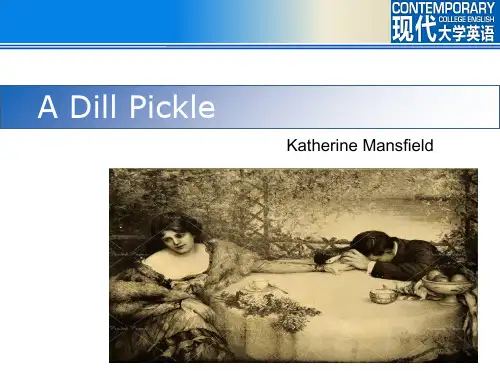
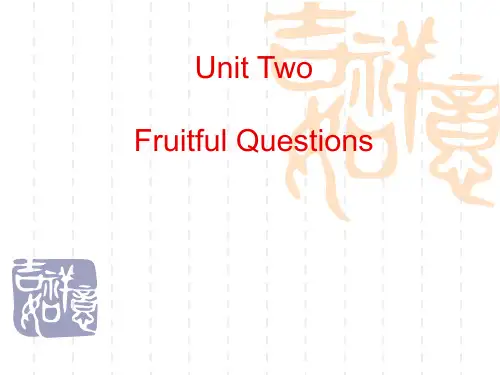
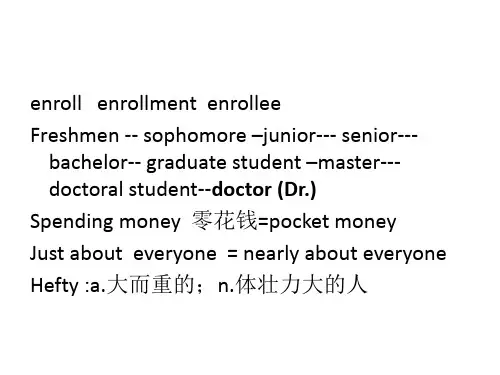
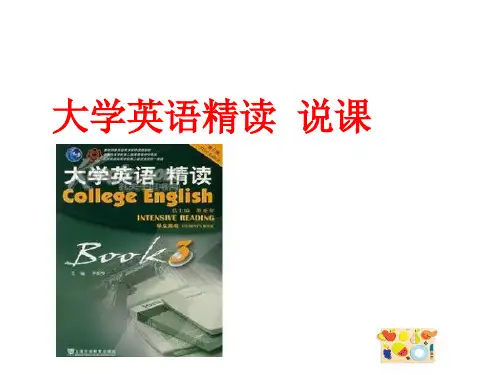
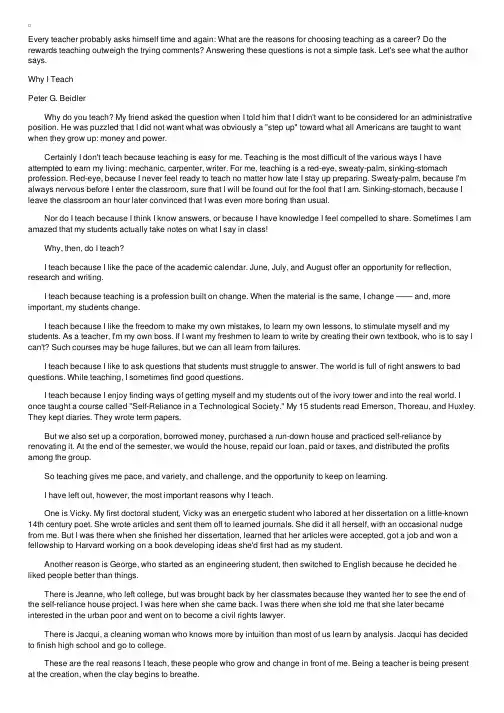
Every teacher probably asks himself time and again: What are the reasons for choosing teaching as a career? Do the rewards teaching outweigh the trying comments? Answering these questions is not a simple task. Let's see what the author says.Why I TeachPeter G. Beidler Why do you teach? My friend asked the question when I told him that I didn't want to be considered for an administrative position. He was puzzled that I did not want what was obviously a "step up" toward what all Americans are taught to want when they grow up: money and power. Certainly I don't teach because teaching is easy for me. Teaching is the most difficult of the various ways I have attempted to earn my living: mechanic, carpenter, writer. For me, teaching is a red-eye, sweaty-palm, sinking-stomach profession. Red-eye, because I never feel ready to teach no matter how late I stay up preparing. Sweaty-palm, because I'm always nervous before I enter the classroom, sure that I will be found out for the fool that I am. Sinking-stomach, because I leave the classroom an hour later convinced that I was even more boring than usual. Nor do I teach because I think I know answers, or because I have knowledge I feel compelled to share. Sometimes I am amazed that my students actually take notes on what I say in class! Why, then, do I teach? I teach because I like the pace of the academic calendar. June, July, and August offer an opportunity for reflection, research and writing. I teach because teaching is a profession built on change. When the material is the same, I change —— and, more important, my students change. I teach because I like the freedom to make my own mistakes, to learn my own lessons, to stimulate myself and my students. As a teacher, I'm my own boss. If I want my freshmen to learn to write by creating their own textbook, who is to say I can't? Such courses may be huge failures, but we can all learn from failures. I teach because I like to ask questions that students must struggle to answer. The world is full of right answers to bad questions. While teaching, I sometimes find good questions. I teach because I enjoy finding ways of getting myself and my students out of the ivory tower and into the real world. I once taught a course called "Self-Reliance in a Technological Society." My 15 students read Emerson, Thoreau, and Huxley. They kept diaries. They wrote term papers. But we also set up a corporation, borrowed money, purchased a run-down house and practiced self-reliance by renovating it. At the end of the semester, we would the house, repaid our loan, paid or taxes, and distributed the profits among the group. So teaching gives me pace, and variety, and challenge, and the opportunity to keep on learning. I have left out, however, the most important reasons why I teach. One is Vicky. My first doctoral student, Vicky was an energetic student who labored at her dissertation on a little-known 14th century poet. She wrote articles and sent them off to learned journals. She did it all herself, with an occasional nudge from me. But I was there when she finished her dissertation, learned that her articles were accepted, got a job and won a fellowship to Harvard working on a book developing ideas she'd first had as my student. Another reason is George, who started as an engineering student, then switched to English because he decided he liked people better than things. There is Jeanne, who left college, but was brought back by her classmates because they wanted her to see the end of the self-reliance house project. I was here when she came back. I was there when she told me that she later became interested in the urban poor and went on to become a civil rights lawyer. There is Jacqui, a cleaning woman who knows more by intuition than most of us learn by analysis. Jacqui has decided to finish high school and go to college. These are the real reasons I teach, these people who grow and change in front of me. Being a teacher is being present at the creation, when the clay begins to breathe. A "promotion" out of teaching would give me money and power. But I have money. I get paid to do what I enjoy: reading, talking with people, and asking question like, "What is the point of being rich?" And I have power. I have the power to nudge, to fan sparks, to suggest books, to point out a pathway. What other power matters? But teaching offers something besides money and power: it offers love. Not only the love of learning and of books and ideas, but also the love that a teacher feels for that rare student who walks into a teacher's life and begins to breathe. Perhaps love is the wrong word: magic might be better. I teach because, being around people who are beginning to breathe, I occasionally find myself catching my breath with them. NEW WORDS administrative a. of the management of affairs ⾏政的,管理的 administration n. 管理(部门),⾏政(机关) puzzle vt. fill with doubt and confusion 使迷惑 step (-) up n. promotion; increase in size, speed, etc. mechanic n. skilled workman, esp. one who uses or repairs machines and tools 机械⼯;机修⼯ sweaty a. covered with sweat, sweating palm a. ⼿掌 profession n. occupation, esp. one requiring special training, such as law, medicine, or teaching convince vt. make (sb.) feel certain; cause (sb.) to realize compel vt. force (sb. or sth. to do sth.) pace n. rate or speed of development, or in walking, etc. 速度;步速 calendar n. ⽇程表,⽇历 opportunity n. favourable occasion or chance reflection n. careful thinking; consideration 深思;考虑 reflect vi. stimulate vt. encourage; excite 刺激;激励 freshman n. student in his first year at a college or university failure n. a person, attempt, or thing that fails; lack of success ivory n. 象⽛ ivory tower n. place or condition of retreat from the world of action into a world of ideas and dreams 象⽛塔 self-reliance n. ability to do things and make decisions by oneself 依靠⾃⼰;⾃⼒更⽣ reliance n. trust, confidence; dependence 信赖;信⼼;依靠 technological a. of or related to technology 技术的 corporation n. (AmE)有限公司 run-down a. old and broken or in bad condition renovate vt. restore (old buildings, oil paintings, etc.) to a former, better state 修复,修整 semester n. (AmE) either of the two periods into which a school year is divided; term 学期 repay。
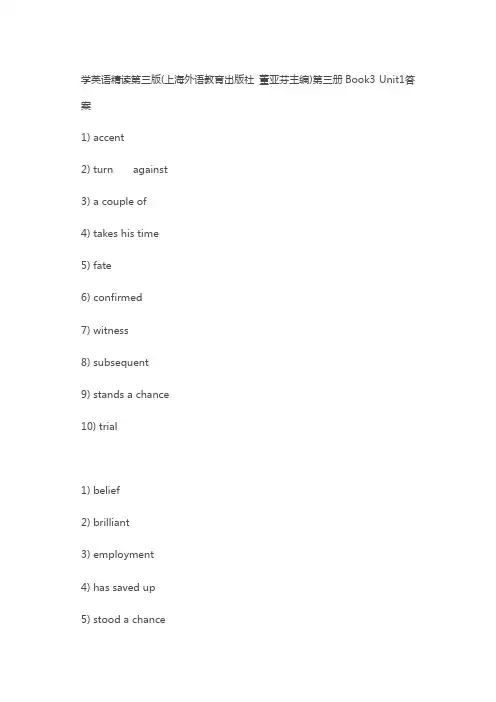
学英语精读第三版(上海外语教育出版社董亚芬主编)第三册Book3 Unit1答案1) accent2) turn against3) a couple of4) takes his time5) fate6) confirmed7) witness8) subsequent9) stands a chance10) trial1) belief2) brilliant3) employment4) has saved up5) stood a chance6) were awarded7) Presumably8) conducted9) casual10) around (which student life) revolves1) Joe wrote to say that he had to put off his visit because of his illness.2) Despite the noise, they went on working as if nothing were happening.3) Traffic was held up for several hours by the accident.4) Called (up) on to speak at the meeting, I couldn't very well refuse.5) Mrs. Stevenson looked in the cupboard and found there was not a single lump of sugar left.6) It was the rumor that turned Joe against his twin brother.7) We wondered how Sara was getting on in her new job.8) Although Anne agreed with me on most points, there was one on which she was unwilling to give in.9) Visitors could photograph almost anything here without having to ask for permission.10) Whether we make an excursion or stay home will depend on tomorrow's weather.1) uncertain,unafraid,unacceptable,unfamiliar,unequal;2) unanswered,unattached,unknown,undecided,unexpected;3) unhappily,unskillfully,unconsciously,unnecessarily,uncomfortably;4) unsay,undress,untie,unlock,unload。
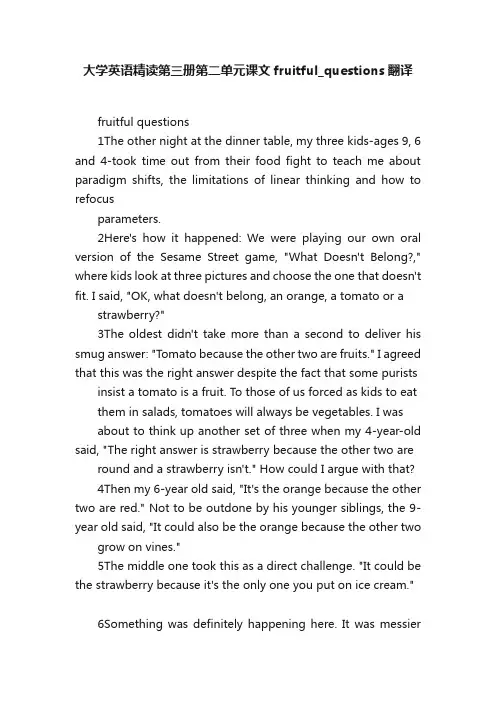
大学英语精读第三册第二单元课文fruitful_questions翻译fruitful questions1The other night at the dinner table, my three kids-ages 9, 6 and 4-took time out from their food fight to teach me about paradigm shifts, the limitations of linear thinking and how to refocusparameters.2Here's how it happened: We were playing our own oral version of the Sesame Street game, "What Doesn't Belong?," where kids look at three pictures and choose the one that doesn't fit. I said, "OK, what doesn't belong, an orange, a tomato or a strawberry?"3The oldest didn't take more than a second to deliver his smug answer: "Tomato because the other two are fruits." I agreed that this was the right answer despite the fact that some purists insist a tomato is a fruit. To those of us forced as kids to eat them in salads, tomatoes will always be vegetables. I wasabout to think up another set of three when my 4-year-old said, "The right answer is strawberry because the other two are round and a strawberry isn't." How could I argue with that?4Then my 6-year old said, "It's the orange because the other two are red." Not to be outdone by his younger siblings, the 9-year old said, "It could also be the orange because the other two grow on vines."5The middle one took this as a direct challenge. "It could be the strawberry because it's the only one you put on ice cream."6Something was definitely happening here. It was messierthana food fight and much more important than whether a tomato isa fruit or vegetable. My kids were doing what Copernicus didwhen he placed the sun at the center of the universe,readjusting the centuries-old paradigm of an Earth-centered system. They were doing what Reuben Mattus did when he renamed his Bronx ice cream Haagen-Dazs and raised theprice without changing the product. They were doing what Edward Jenner did when he discovered a vaccination forsmallpox by abandoning his quest for a cure.7Instead of studying people who were sick with smallpox, he began to study people who were exposed to it but never got sick. He found that they'd all contracted a similar but milder disease, cow pox, which vaccinated them against the deadly smallpox.82They were refocusing the parameters. They were redefining the problems. They were reframing the questions. In short, they were doing what every scientist who's ever made an important discovery throughout history has done, according to Thomas Kuhn, in his book, "The Structure of Scientific Revolutions":They were shifting old paradigms.9But if this had been a workbook exercise in school, every kid who didn't circle tomato would have been marked wrong. Every kid who framed the question differently than "Which is not afruit?" would have been wrong. Maybe that explains why so many of the world's most brilliant scientists and inventors were failures in school, the most notable being Albert Einstein,who was perhaps this century's most potent paradigm-shifter.104This is not meant to be a critique of schools. Lord knows, that's easy enough to do. This is, instead, a reminder that there are real limits to the value of information. I bring this up because we seem to be at a point in the evolution of our society where everyone is clamoring for more technology, for instant access to ever-growing bodies of information.11Students must be on-line. Your home must be digitally connected to the World Wide Web. Businesses must be able to download volumes of data instantaneously. But unless we shift our paradigms and refocus our parameters, the super information highway will lead us nowhere.12We are not now, nor have we recently been suffering from a lack of information. Think how much more information we have than Copernicus had four centuries ago. And he didn't do anything less Earth-shattering (pun intended) than completely change the way the universe was viewed. He didn't do it byuncovering more information --- he did it by looking differently at information everyone else already had looked at. EdwardJenner didn't invent preventive medicine by accumulatinginformation; he did it by reframing the question.13What we need as we begin to downshift onto the information highway is not more information but new ways of looking at it.We need to discover, as my kids did, that there is more than one right answer, there is more than one right question and there is more than one way to look at a body of information. We need to remember that when you have only a hammer, youtend to see every problem as a nail.。